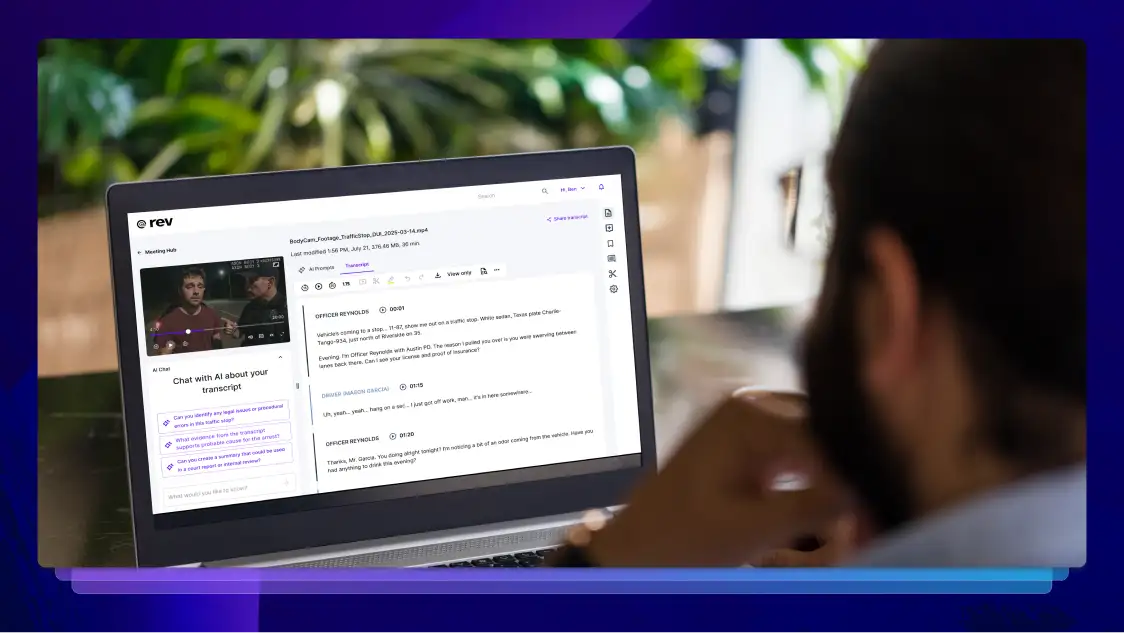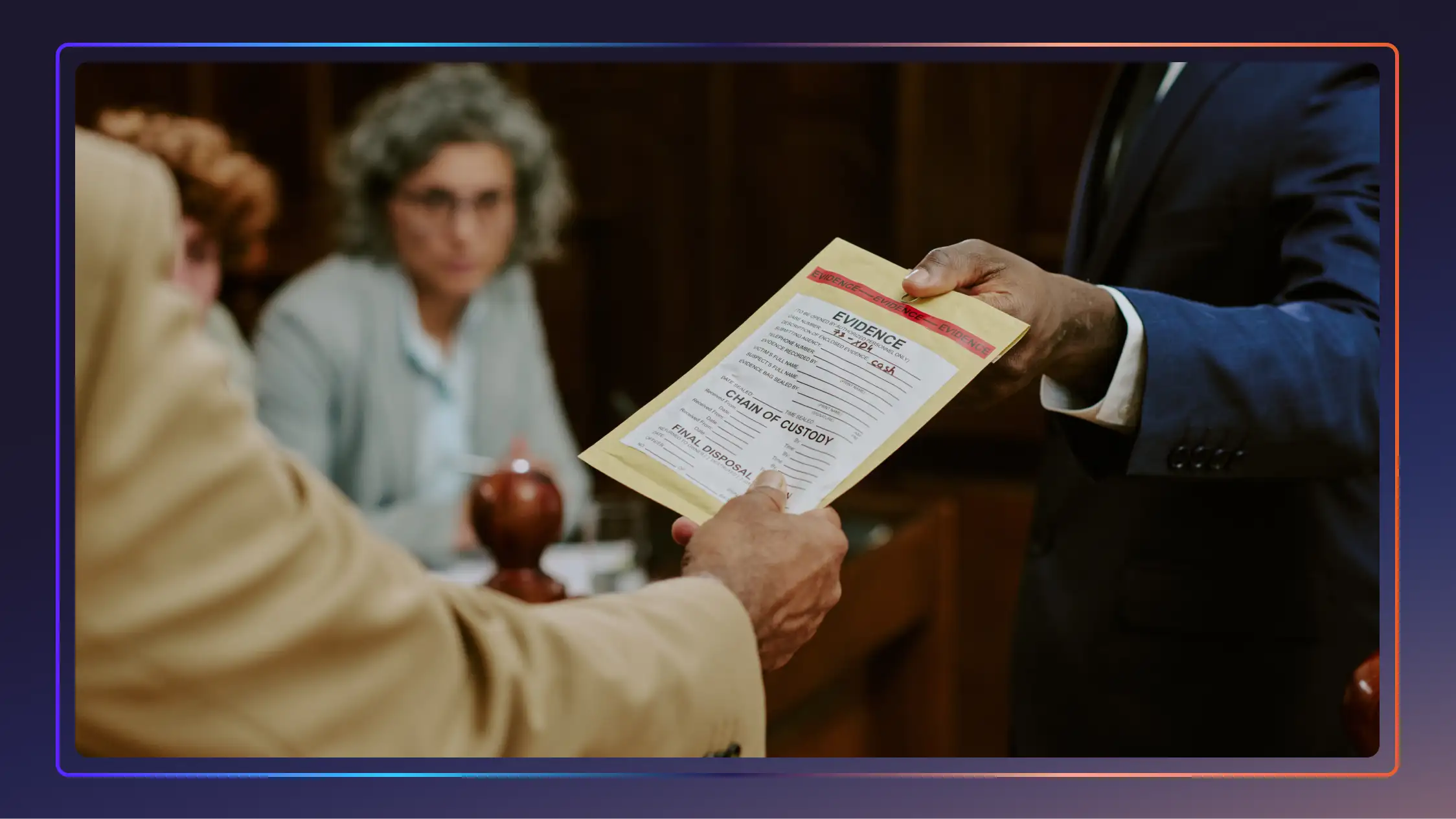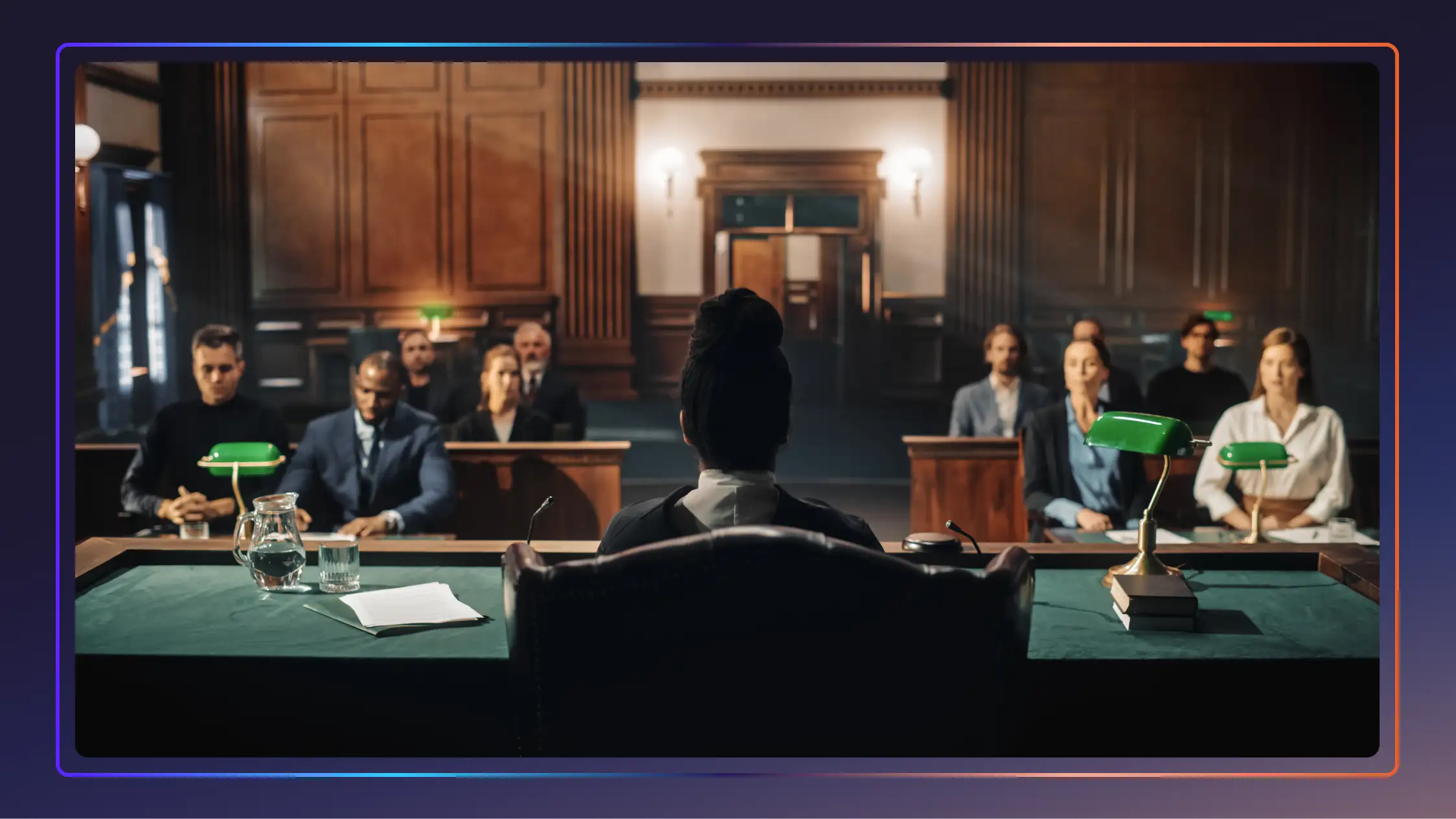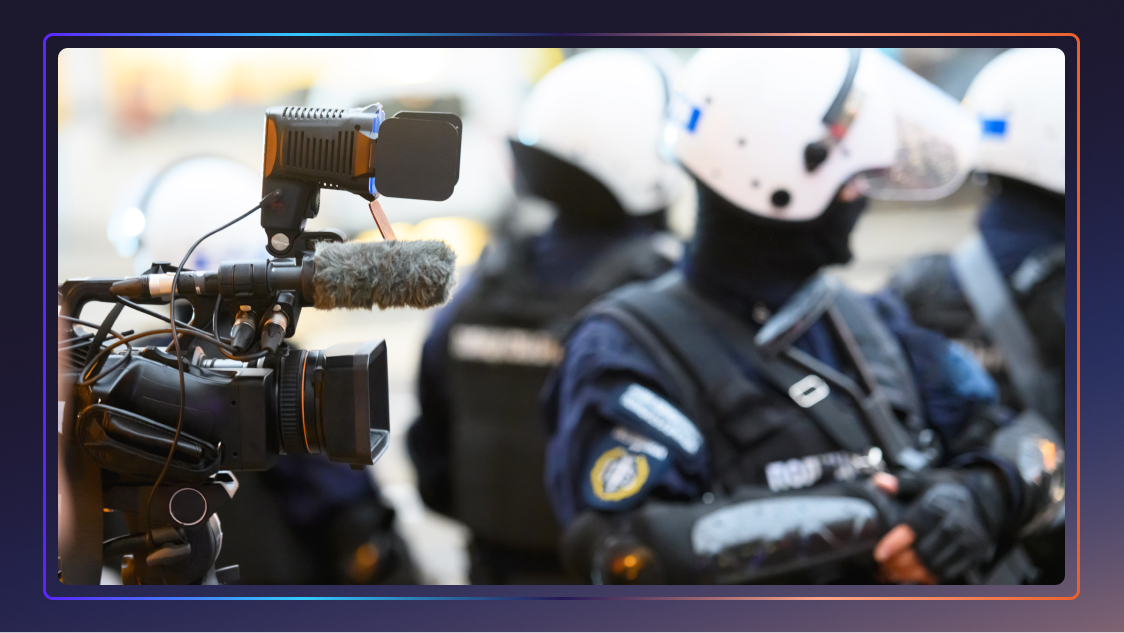What Is Legal Transcription?
Legal transcription is a specialized form of typing that converts audio and video files into text. Here’s what you need to know, from the process to its benefits.

Legal transcription is the act of turning legal audio or video recordings into text. A legal transcriptionist (or software) listens to the files—such as depositions, courtroom proceedings, or witness testimony—and records every word spoken into an accurate, text-based record of events that can then easily be scanned, shared, and searched. Transcription makes the legal process much more efficient.
“Transcripts may look like busywork until your memory of a client call blurs two weeks later,” says Andrew Izrailo, Senior Corporate and Fiduciary Manager at Astra Trust. “Being able to read every hesitation and correction makes the difference between guesswork and a solid fiduciary brief. The page speaks again when the brain has moved on.”
Bottom line is that legal transcription helps turn hours and hours of cumbersome recorded files into a much more useful format that saves attorneys, judges, and legal staffers hours of work while raising everyone’s productivity.
Below, we break down the benefits of legal transcription, how to get it done, the differences between transcription and court reporting, and the best services to consider for your legal transcription work. Let’s dive in!
What Sets Legal Transcription Apart
The primary difference between legal transcription and most other types of transcription is that a legal transcript captures legal matters, whereas other types of transcription can capture a wide range of recordings, like podcasts, phone calls, work meetings, or even social media clips. Legal transcription is for court proceedings, client and witness interviews, depositions, lawyer voice notes, and anything related to a legal case.
Another vital difference between legal audio transcription and other transcription is that accuracy is an absolute necessity in the legal world. For example, imagine if a transcriptionist doing legal typing mishears a line of witness testimony, and the official legal transcript says that a suspect was spotted on “West Street” instead of “West Avenue.” If this mistake is never caught, someone’s alibi could be nullified. See how that could be a problem?
The person or transcription platform transcribing your legal documents should have some knowledge of the legal industry, too. Though it’s possible for any platform to adequately do the job, a good legal transcription service should have a deep understanding of the legal process, legal terminology, court procedures, and formatting required for the specific job.
Many employers require human legal transcriptionists to be certified by an organization like the American Association of Electronic Reporters and Transcribers (AAERT). When using an AI-based platform, ensure that the platform has experience in the legal industry.
Why Is Legal Transcription Important?
Legal transcription is important because it’s an official record of events that can dictate the outcome of a trial. It turns vast reams of spoken information into usable, manageable content.
Some of the benefits of legal transcription include:
- Saving hours, if not days, of attorney prep time
- Making hours of recorded information easily usable
- Making information much more accessible
- Helping attorneys identify discrepancies in testimony
A good example of the importance of law transcription is the work Rev does for the Swingle Levin law firm. The Georgia-based criminal defense firm uses Rev to uncover inconsistent testimony when cross-examining witnesses. The firm also uses Rev to:
- Upload and accurately transcribe several hours of interviews
- Turn all spoken testimony into a database of searchable text
- Create cross-examination strategies thanks to easy document review
- Identify key testimony points from interviews
How is Legal Transcription Different from Dictation?
Legal transcription and dictation are different mostly in the way information is captured. Legal dictation is the act of speaking while someone (or something, if using a recording device) captures what you’re saying. Transcription is the actual process of turning the spoken or recorded word into a written document. Typically, transcription is completed from a recording, as opposed to live spoken word.
In short, dictation is the act of speaking for the purpose of transcription. Transcription is the act of creating the actual text document. Legal transcription is a specific type of transcription used to create legal documents. It often requires knowledge of legal jargon and processes, as well as specific templates for the transcribed documents.
Types of Legal Transcription Needs
Legal transcription comes in many forms, each with a specific need and format. Here are a few of the most common types of legal transcription.
- Deposition transcription ensures that the hours of depositions often conducted for a case are captured accurately so that attorneys can easily hone in on specific details and seek out testimony contradictions.
- Courtroom transcription is an official record of legal proceedings, from trials to hearings.
- Dictation transcription turns an attorney’s spoken words, including case notes and voice memos, into professional and often templated documents for later consumption.
On a typical day, a legal transcriptionist might transcribe things like:
- 911 calls
- Legal meetings
- Wiretaps
- Conference calls
- Witness interviews
- Hearings
- Depositions
- Jury instructions
- Interrogations
Law Transcription Process
The legal transcription process isn’t too different from any other transcription process, but there are a few minor distinctions. Here are the steps to get your legal audio or video transcribed:
Step 1: Record Your Audio
It’s pretty commonplace to automatically record most courtroom proceedings, depositions, and interviews. But, if you’re not set up to do so, we recommend at the very least getting a decent microphone, which can generally be purchased for less than $50.
Good audio quality makes transcription much easier, but if you need to record in a challenging environment or with a lot of crosstalk or other disturbances, make sure your transcription services can handle “tough” recordings. Rev, for instance, has industry-leading ASR that can accurately handle poor-quality recordings.
Rev also offers a convenient way of recording your audio: our mobile app that lets you capture audio anywhere straight from your Android or iOS device.
Step 2: Upload Your File
Unless you’re doing your own transcription, you’ll want to find a reliable transcription platform. After you decide who will be transcribing your audio, it’s simply a matter of uploading the audio or video file. Make sure your transcription platform works with the type of files you wish to upload.
Rev can transcribe the following:
- MP3
- MP4
- WMV
- AIF
- M4A
- MOV
- AVI
- VOB
- AMR
- WMA
- OGG
- AAC
- WAV
At Rev, getting your file transcribed is easy. All you have to do is go to our website or mobile app and upload your chosen file or paste a URL to the video or audio track. It’ll automatically be prepared for AI transcription, so if you’d like a human to review, make sure to let us know.
Rev offers bulk upload options and volume discounts as well.
Step 3: Review and Edit Your Transcript
Given the importance of accuracy in legal transcripts, manually reviewing your transcript is a key step. After downloading your transcript draft, review it and make any necessary edits before sharing it. (Remember, the more accurate your transcription platform, the less time you’ll waste on editing!)
Rev makes reviewing and editing your transcripts easy with our multi-file insights feature. You can also ask our AI questions about the transcripts, find errors or discrepancies, and format them into specific templates that meet your legal needs.
Step 4: Download and Share Your Final Transcript
Once you’ve proofread your transcript and made your final edits, you can export it in a variety of formats. Rev offers files in plain text, Microsoft Word, or PDF documents. We also offer multiple-user access, meaning it’s easy to share completed transcripts with your team or even your clients. Multiple people can access the same document at the same time for true collaboration and efficiency.
Step 5: Certify Your Document
Ensuring the legality of your transcript is the final but (arguably) most important step of the legal transcription process. A transcript can be certified when it has been reviewed by a licensed reporter and verified to be accurate and authentic.
To get your legal transcription certified, you need to retain a court reporter, who will review and then attach a signed statement or affidavit attesting that they have reviewed and stand by the integrity of the transcription. The document is now ready to be part of the official record.
This is another area where Rev makes the process easier. Our self-service options for legal transcription let you automatically transform your recordings into court-ready transcripts, and ready-to-certify, jurisdiction-compliant transcripts can be delivered in just 5 business days.
The Role of Technology + AI
There’s no arguing that technology is changing the world of legal transcription. The addition of AI and ASR has made turnaround times practically nonexistent when required, and AI summaries and insights can streamline your entire workflow, freeing you up to focus on important things like strategy and client relations.
AI transcription tools are also helping to fill the gap created by the court reporter shortage. According to the U.S. Bureau of Labor Statistics, the industry expects more than 1,600 job openings for court reporters per year for at least the next decade.
While AI isn’t perfect and there are moral and security concerns, it’s already entirely possible to record court proceedings and upload the file for AI transcription with minimal worry. AI certainly doesn’t eliminate the need for a court reporter, but it can help court reporters work faster and more efficiently.
An important aspect of using AI and similar tech in the legal industry is to ensure that there’s always a human in the loop. Even the best ASR and AI isn’t perfect, and when working with legal transcription, you need it to be perfect. Human review of all vital documents is necessary, and is a big part of the reason we offer human-AI hybrid services.
What To Look For In a Legal Transcription Service
When looking for a legal transcription service, consider things like turnaround times, cost, accuracy, HIPAA (and other) compliance, security, and options like AI features, evidence management, and certified transcription.
Thoroughly vetting a transcription company will help ensure that you find the quality, experience, and security required for law transcription work. Here are, in our opinion, the top 7 legal transcription companies.
Rev Is Ready To Certify
Legal transcription turns long hearings, depositions, phone calls, and interviews into text documents that are easy to use, search, and organize. It makes your entire firm more productive and effective, on or off the case. Rev’s deep experience with legal transcription will streamline your firm’s entire workflow.













.webp)

